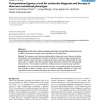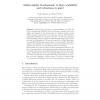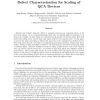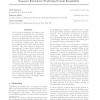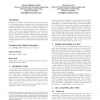32 search results - page 6 / 7 » Mechanisms of Emergent Computation in Cellular Automata |
BMCBI
2007
13 years 7 months ago
2007
Background: A finite state machine manipulating information-carrying DNA strands can be used to perform autonomous molecular-scale computations at the cellular level. Results: We ...
PPSN
2004
Springer
14 years 24 days ago
2004
Springer
Evolving large phenotypes remains nowadays a problem due to the combinatorial explosion of the search space. Seeking better scalability and inspired by the development of biologica...
DFT
2004
IEEE
13 years 11 months ago
2004
IEEE
Quantum dot Cellular Automata (QCA) is amongst promising new computing scheme in the nano-scale regimes. As an emerging technology, QCA relies on radically different operations in...
ICML
2008
IEEE
14 years 8 months ago
2008
IEEE
The problem of identifying the minimal gene set required to sustain life is of crucial importance in understanding cellular mechanisms and designing therapeutic drugs. This work d...
GLVLSI
2005
IEEE
14 years 1 months ago
2005
IEEE
Quantum-dot Cellular Automata (QCA) is a novel computing mechanism that can represent binary information based on spatial distribution of electron charge configuration in chemica...
